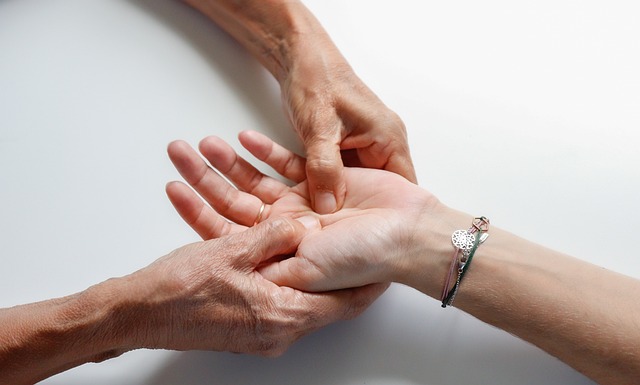Sleep is vital for physical and mental health, and mindfulness practices like meditation and deep breathing can significantly enhance its quality. Integrating these techniques into your pre-sleep routine calms the mind, reduces stress, and prepares you for deeper rest. An optimal sleep environment, achieved through adjustments to physical space and mindfulness, includes cool temperatures, darkness, quiet, comfortable bedding, and a relaxing bedtime routine. Healthy habits such as regular exercise, balanced diet, avoiding stimulants before bed, and limiting screen time also boost post-sleep recovery alongside consistent sleep schedules. Mindfulness practices are key to achieving restorative sleep and improved overall well-being.
Maximize your recovery potential with our comprehensive guide on sleep optimization strategies. Understanding the profound role sleep plays in physical and mental restoration, this article delves into essential techniques. From cultivating mindfulness practices to create a serene bedtime routine, to designing an optimal sleep environment and adopting healthy post-sleep habits—discover how these strategies can transform your rest for enhanced overall well-being.
- Understanding Sleep and Its Role in Recovery
- Mindfulness Practices for Calming the Mind Before Bed
- Creating an Optimal Sleep Environment
- Healthy Habits to Enhance Post-Sleep Recovery
Understanding Sleep and Its Role in Recovery

Sleep plays a pivotal role in our body’s recovery process, allowing us to rejuvenate and perform at our best. It is during sleep that our bodies initiate critical repair functions, consolidate memories, and regulate hormones essential for growth and healing. Understanding this fundamental relationship between sleep and recovery can empower individuals to optimize their rest time effectively.
Mindfulness practices emerge as a powerful tool in enhancing sleep quality. By promoting present-moment awareness, mindfulness helps alleviate stress and anxiety, which are common barriers to restful sleep. Techniques like meditation and deep breathing exercises can create a calming atmosphere, signaling the body to wind down. Integrating mindfulness into daily routines can lead to improved sleep architecture, ensuring individuals experience all stages of sleep necessary for optimal recovery.
Mindfulness Practices for Calming the Mind Before Bed

Before drifting off to sleep, engaging in mindfulness practices can significantly aid in calming an active mind. These practices involve focusing on the present moment, acknowledging and accepting thoughts and feelings without judgment. Techniques such as deep breathing exercises, meditation, or gentle yoga can help reduce mental restlessness and create a sense of tranquility. By fostering a state of relaxation, these mindfulness practices prepare the mind for sleep, allowing individuals to experience deeper and more restorative rest.
Incorporating mindfulness into your pre-sleep routine is a powerful strategy for optimizing sleep quality. It helps separate the day’s events from the need to process them mentally while asleep. Instead, it encourages a mental shift towards serenity, which can enhance overall well-being and facilitate better recovery during sleep.
Creating an Optimal Sleep Environment

Creating a peaceful and supportive sleep environment is essential for optimizing your rest and recovery. This involves a combination of designing your space, establishing routines, and incorporating mindfulness practices to promote a calm atmosphere. Start by ensuring your bedroom is cool, dark, and quiet—a comfortable temperature around 65°F (18°C) is ideal. Invest in high-quality, supportive bedding and pillows that align with your sleep preferences. Consider using blackout curtains, earplugs, or a white noise machine to block out disturbances.
Mindfulness practices can further enhance your sleep environment. Try incorporating activities like deep breathing exercises, gentle stretching, or meditation before bed. These techniques help calm the mind, reduce stress, and prepare the body for sleep. Additionally, keeping a consistent sleep schedule, limiting screen time in the evening, and creating a relaxing bedtime routine can signal to your body that it’s time to wind down and enter a restful state.
Healthy Habits to Enhance Post-Sleep Recovery

Maintaining healthy habits both before and after sleep can significantly enhance post-sleep recovery. Incorporating mindfulness practices such as meditation or deep breathing into your routine can help calm the mind and prepare the body for rest, making it easier to fall asleep and achieve deeper sleep cycles. Regular exercise during daylight hours also plays a crucial role in optimizing sleep quality; physical activity boosts circulation and releases endorphins that promote relaxation when combined with proper sleep hygiene.
A balanced diet supports recovery by providing essential nutrients needed for muscle repair and cognitive function. Avoiding stimulants like caffeine late in the day and limiting exposure to screens before bed further contributes to a healthier sleep environment. Establishing a consistent sleep schedule, creating a relaxing bedtime routine, and ensuring a comfortable sleep setting with optimal temperature and lighting all work together to create conditions conducive to restorative sleep and improved recovery.
Optimizing sleep is a powerful tool for enhancing recovery and overall well-being. By understanding the science behind sleep and implementing practical strategies, such as mindfulness practices, creating a peaceful sleep environment, and adopting healthy habits, individuals can transform their sleep quality. These simple yet effective techniques empower folks to navigate their daily routines with renewed energy and a calmer mind, underscoring the profound impact of quality rest on our lives.
